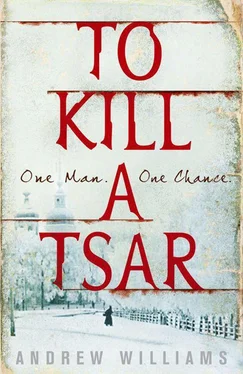Her voice split the still night like a knife to the belly of a beast. It was a scream to wake the conscience of a dead man. The first man lunged at her. Swinging the sack from her shoulder, she struck him on the side of the head, throwing him off balance and heavily to one knee. The sack was at her feet now and the second man grabbed at it, pushing her away. But he was smaller and struggled to lift it with one hand.
‘Here,’ she screamed again. ‘Thieves! Murderers!’
‘Shut up or I’ll finish you.’
‘Murderers!’ And she kicked out blindly at the first man rising to his feet. Angry, she was so angry, grinding her teeth with anger.
Then from somewhere a man’s voice: ‘Hey, what’s happening there?’
She glanced up to see a lantern swinging towards them. ‘Thieves!’
In desperation, one of them tugged at the sack, lifting it from the ground to hoist it on to his back. She threw herself on him with her fists, bending to sink her teeth deep into his hand. A cry of pain and the sack slipped from him. But someone had her by the hair and was dragging her down. Then she was struck hard in the face, knuckles jarring her cheekbone. She fell backwards, her head bursting with white light. She curled instinctively into a ball. The sack was close at hand, and she reached out to grasp it by the neck. But one of the men kicked out at her viciously, catching her just below the ribs, and she slipped into darkness, heaving for air, conscious of nothing but the pain in her face and side. Then anger and fear kindled inside her again.
‘No, no!’ And with a stubborn act of will, she opened her eyes and clutched the sack tighter and with both hands, tensing in readiness for the next blow. But it did not come. They had gone. She pulled the sack towards her and lay in the long grass beside it, trembling with shock, a film of cold perspiration prickling her skin. Her cheek was throbbing and as she lifted her head, the shadowy world within her circumference began to spin.
‘Hey, is anyone there? Where are you?’ Someone was pushing quickly through the grass towards her.
‘Here.’ How pathetic her voice sounded. ‘Here.’
The ring of light from a lantern and a bent silhouette above her. Her rescuer crossed himself, and she could tell from the two fingers he used to perform his blessing that he was an Old Believer.
‘Are you all right?’ he asked, sinking to his haunches and lifting the lantern close to her face.
It took another supreme act of will just to lift one foot in front of the other; every jarring step sent a frisson of pain through her body. She had no choice but to let him carry the sack. Her Good Samaritan was called Vladimir and his home was close to the railway track, a stone’s throw from the newcomers’ cottage. She did not need to tell him where she was going, he led her there without question.
It was a poor wooden place, like most of the others in the village, close enough to the track for the trains to rattle the windows. The party had paid a thousand roubles, and Lev Hartmann, whose parents were workers and who knew how to behave like one, had been chosen to live there with a comrade posing as his wife. And it was Sophia Perovskaya who opened the door to Anna and, after only a glance, threw her arms about her. ‘What’s happened to you, Annushka?’
Before Anna could speak, her guide stepped into the light from the door and dropped the sack at her feet.
‘Thank you, Father,’ Anna muttered. ‘Thank you.’ But Vladimir had vanished without a word.
‘Does she have it?’ A strange apparition of the man Anna knew to be Lev Hartmann had come to the door. He was caked from head to foot in mud. ‘Is this it?’ he asked, snatching up the sack.
‘For goodness sake, get back inside,’ Sophia said, shooing him like a goose back into the house, ‘someone could see you like that.’ She led Anna by the hand into the living room and made her sit at the table. ‘Was it the police?’
Anna gave a little shake of the head. She was exhausted, and now she was among friends the courage began to seep from her.
Sophia poured a little warm water from the samovar into a bowl and placed it on the table with a fine linen cloth and some soap. ‘Let me.’
‘Thank you,’ Anna whispered, struggling with the tide of emotion welling inside. Sophia Perovskaya stroked her cheek lightly with the back of her hand then dabbed the corner of the cloth in the water and began gently, so gently, wiping the mud from her face. Anna was full of gratitude for the warmth and tenderness in her friend’s blue eyes and round innocent face. This woman is my family, she thought, and she reached for Sophia’s free hand, a fellowship of people committed to the highest ideals: me — the illegitimate daughter of a landlord and serf — and Sophia Lvovna Perovskaya, from one of the noblest families in the empire.
‘Why are you smiling?’ Sophia asked.
‘I was thanking a god I don’t believe in for your kindness, Sonechka, and for our comradeship.’
Sophia Perovskaya gave her hand a little squeeze: ‘Yes. But now you must tell me what happened?’
Painfully, hesitantly, Anna gave a brief account of the attack and her rescue. And as she spoke her friend smoothed cool arnica ointment on her bruised cheek and hands. So delicate, so gentle, what a strange childlike creature she is, Anna thought. Diminutive, petite, with flaxen braids and fine features, Perovskaya was twenty-five but often taken for ten years younger. In her simple country smock she looked very like a peasant girl.
‘The executive committee of the party owes you its thanks,’ she said, bending forward to kiss Anna’s cheek. ‘It’s a small miracle you weren’t blown to pieces.’
‘But there isn’t very much, is there?’ said Hartmann. He had lifted a box from the sack and placed it on the table near them. Prising it open with a chisel, he took from it a short brown cylinder of dynamite — eight inches long and one and a half in diameter — twirling it between his fingers.
‘Alexander is looking for more dynamite,’ Anna replied.
Hartmann nodded.
‘How far is the tunnel?’
He gave a non-committal shrug and turned, his hand on the knob of the door to the adjoining room: ‘Grishka is in there with Aronchik. But it’s my turn again, I think.’
‘It’s too slow,’ said Sophia Perovskaya when he had gone. ‘We’re still twenty yards short.’
‘Is Grigory Goldenberg with you?’
‘He’s in the fields spreading the earth from the tunnel. But men like Grigory are not used to this sort of work — that’s why we’re behind.’
There had been one problem after another, Sophia explained. The party’s intellectuals were breaking under the strain of real labour. First they had driven the tunnel up against the base of a telegraph pole, then heavy rain had brought the gallery roof down, leaving a crater in the ground close to the path used by the gendarme patrols. And when the tunnel finally reached the railway embankment they had been forced to use a drill to cut their way through stone. It was claustrophobic, back-breaking labour, the tunnel no wider than a man’s shoulders. The digger wielding the spade at the face carried a dose of poison in case he was buried alive.
‘But we’ve all taken a vow not to be taken alive.’ On a bench beneath one of the windows there was a large bottle of nitroglycerine; on the table within easy reach, Sophia Perovskaya’s pistol. ‘If the gendarmes burst in upon us I’m to fire a bullet into the bottle,’ she said. There would be enough explosive to blow the three-roomed house and all its occupants to kingdom come — and some of the gendarmes too.
‘But now you must sleep a while, Annushka. You can’t go back tonight. You can sleep in my bed,’ said Sophia, pouring vodka into a glass tumbler. ‘Here, drink this.’
Читать дальше












